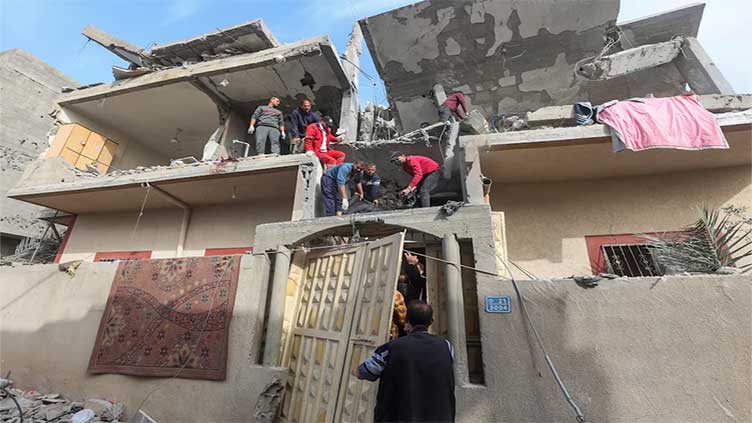Israeli strikes on Rafah raise fear assault could begin

World
Israeli strikes on Rafah raise fear assault could begin
(Reuters) – Israel bombed at least three homes in Rafah overnight, raising new fear among the more than a million people sheltering in the last refuge on the southern edge of the Gaza Strip that a long-threatened ground assault could be coming.
One of the airstrikes killed 11 people from a family, health officials said.
Mussa Dhaheer, looking on from below as neighbours helped an emergency worker lower a victim in a black body bag from an upper storey, said he had awakened to the blast, kissed his terrified daughter, and rushed outside to find the destruction. His father, 75, and mother, 62, were among the dead.
"I don't know what to do. I don't know what to say. I can't make sense of what happened. My parents. My father with his displaced friends who came from Gaza City," he told Reuters.
"They were all together, when suddenly they were all gone like dust."
At another bomb site, Jamil Abu Houri said the intensification of air strikes was Israel's way of showing its disdain for a UN Security Council resolution last week demanding an immediate ceasefire. Next up, he fears a ground assault on Rafah, which Israel has threatened to carry out despite pleas from its closest ally Washington that this would cause too much harm to civilians.
"The bombing has increased, and they have threatened us with an incursion, and they say that have been given the green light for the Rafah incursion. Where is the Security Council?" Abu Houri said.
"Look at our little ones. Look at our children. Where should we go? Where should we go?"
Separately, in the Israeli occupied West Bank, which has seen worsening bloodshed in parallel with the Gaza war, three Palestinians were killed and four others wounded by Israeli fire during a raid in Jenin overnight, the Palestinian health ministry said on Wednesday.
At least 32,000 Palestinians have been killed in Israel's offensive into Hamas-run Gaza, according to the health ministry there, with thousands of other dead believed unrecovered under rubble. The war began after Hamas fighters raided Israel on Oct. 7, killing 1,200 people and abducting 253 hostages according to Israeli tallies.
Israeli forces just north of Rafah kept the two main hospitals in Khan Younis, Al-Amal and Nasser Hospital, under a blockade imposed late last week. In the north, they were still operating inside Al Shifa, the enclave's largest hospital, which they stormed more than a week ago.
Israel says the hospitals have been used by Hamas fighters, which Hamas and medical staff deny. The Israeli military has said it killed and captured hundreds of fighters in a battle in Al Shifa. Hamas says civilians and medics were rounded up.
Gaza's health ministry said wounded people and patients were being held inside the human resources department that was not equipped to provide them with healthcare.
Residents living nearby report hearing explosions in and around Al Shifa and lines of smoke coming from buildings inside the medical facility.
"A war zone, this is how it looks in and around Al Shifa," Mohammad Jamal, 25, who lives 1 km away from Al Shifa, said via a mobile phone chat app.
"Explosions never stop, we see lines of smoke coming from inside, no one moves even in streets that are hundreds of meters away because of Israeli snipers on rooftops of buildings," he said.


